- Home
- Nevil Shute
No Highway Page 14
No Highway Read online
Page 14
There was nothing more that we could do, for the moment, till Dr. Martin turned up. I stood there with them in silence. Back in my office the telephone, I knew, would be ringing almost continuously as various infuriated people tried to find me; the storm would, be mounting as frustrations multiplied because I was not at the office. Too bad; they would have to multiply. I had to tackle each of my responsibilities in turn; one thing at a time.
The doctor came at last; I knew him slightly. We told him all we knew; then he went in to her with Shirley. He came out after ten minutes, and we went down to the sitting-room, so called, that was Honey’s drawing office.
“Well,” he said, “she’s got concussion, of course. I can’t find any fracture. You think she fell downstairs; the bruising supports that. She was alone in the house … I think that’s very wrong, if I may say so.” He stared at us severely. “A child of that age is much too young to be left alone at night.”
“I quite agree with you,” I said. “Unfortunately, her father is abroad and the arrangements that he made for her seem to have broken down.”
He nodded. “Well, she needs care now. She’ll probably wake up before long, and when she does there may be a good deal of vomiting. She must stay in bed for at least a week. I’ll look in again this afternoon. Who is in charge of her?”
There was an awkward pause. “I don’t think anybody is,” said Shirley. “There’s only us.”
I explained. “I’m the head of his department at the R.A.E.”
“Well, who is going to look after her?”
I said doubtfully, “Couldn’t she go into a hospital?”
“Not here,” the doctor said. “I haven’t got a bed. We might be able to get her into Guildford or Woking.”
Shirley said, “Dennis, we can take her. I mean, we are mixed up in it, in a sort of way. And if it’s only being sick and that sort of thing—well, I can cope with that. I think we ought to take her. I’d hate to think of her waking up in hospital amongst strangers.”
I said, “Yes, old thing—but where? You couldn’t keep her here?”
She turned to the doctor. “Could we take her to our flat? Can she be moved?”
In the end we telephoned for the ambulance and put her on the stretcher unconscious as she was, and took her to the flat and put her in bed. We both skated over the implications of that, because Shirley and I only had one bed between us and we put Elspeth in that one, and there was no other bed in the flat. We shelved the problem of where we were going to sleep ourselves till bedtime got a little nearer, and that was the quiet evening on which I had planned to sit down and run over my lecture on the “Performance Analysis of Aircraft Flying at High Mach Numbers.”
By the time all that was done and sorted out it was ten minutes past two; I had had no lunch and had to get into my car and dash back to the office to catch up with my blazing row.
Miss Learoyd had a whole list of people who had left their numbers asking or demanding that I should ring them. There was Ferguson and Seabright in the Ministry, and Carter in the Ministry of Civil Aviation, and Sir David Moon of C.A.T.O., and Drinkwater in the Air Registration Board and—my heart sank—Mr. Prendergast of the Rutland Aircraft Company, the designer of the Reindeer.
I asked Miss Learoyd to see if she could locate the Director. She asked his secretary, who told her that after his committee meeting he had intended to come back by Kew Gardens, to look at the flowers.
I sighed, and put in a call first of all to Ferguson. But before it came through, the exchange asked me if I would take an incoming call. It was from Sir David Moon, the Chairman of C.A.T.O.
He said, “Is that Dr. Scott?”
“This is Scott speaking,” I replied.
“Is a Mr. Honey a member of your department, Dr. Scott?”
“Yes,” I said. “He’s not here at the moment. He’s in Canada.”
“I am very well aware of that,” he said. “I have been trying to make contact with your Director, but he seems to be away. Are you aware of what your Mr. Honey has been doing, Dr. Scott?”
“No—I haven’t heard from him yet. There’s hardly been time.” I wondered what on earth the trouble was.
“Then you don’t know that he has been responsible for destroying one of our aircraft?”
I had a sudden sickening feeling in my stomach. “Destroying one of your aircraft? Whatever do you mean, sir?”
“I understand that he deliberately raised the undercarriage while the machine was standing on the ground at Gander. I need hardly say that the damage is very extensive indeed.”
I was staggered. “But—but how could he have done that? There must be some mistake, sir. Our people don’t make errors of that sort.”
“I tell you, this wasn’t an error,” he said forcibly. “It was done deliberately and maliciously, according to the report we have received.”
“I’m afraid I just can’t believe that,” I said. “I know Mr. Honey very well. He’s not a fool. You say this happened at Gander?” I was beginning to recover from the shock and think.
“That is correct.”
“What sort of aircraft was it?” I inquired.
“A Reindeer.”
“The Reindeer that he had flown over in last night? The one that was on loan to A.B.A.S. and had flown 1,400 hours?”
“I don’t know how many hours it had flown. Thanks to the antics of your officer, it will be a long time before it flies again.”
I said, “If that’s the machine, Sir David, this may possibly be true. Have you seen Mr. Carnegie since I spoke to him this morning, insisting that that aircraft should be grounded?”
He said, “Yes, I have. And I may tell you here and now, Dr. Scott, that this organisation will not tolerate technical secrecy where our aircraft are concerned. If you suspect at any time that there are latent defects in the aircraft that we operate, it is your duty to come forward and tell us immediately. I understand from Mr. Carnegie that you have been considering a defect in the tailplane of the Reindeer for some weeks behind closed doors, till suddenly you came forward this morning and demanded that a certain aircraft should be grounded and put out of service at ten minutes’ notice, without disclosing any technical reason for your action. Now, is that correct or not?”
“Broadly speaking,” I said slowly, “that is quite correct. It came as a complete surprise to us this morning to learn that a Reindeer had done 1,400 hours. When we got that news quick action became necessary, and we decided that it must be grounded right away. Tell me, this machine that had the undercarriage accident at Gander—was that the same machine?”
“It was the machine that flew across last night,” he said. “The one that had your representative on board.”
“Then it was the same machine,” I replied. “You say that Mr. Honey was responsible for retracting the undercarriage while the aircraft was standing on the ground?”
“That is so. The signal that we have received states that in the most explicit terms.”
“I can only say I’m very sorry this has happened,” I said. “Where is Mr. Honey now?”
“I presume that he’s at Gander.”
I thought quickly. This new row over the smashed Reindeer was likely to overshadow the one about grounding the Reindeer; there would be a thumping repair bill to be paid by somebody. If it was true that Honey, a Government servant, had pulled up the undercarriage deliberately, inevitably the Treasury would come in at some stage or another; there was no knowing where the thing would end. Honey would have to come back to this country to tell us his end of it and the investigation of the crash in Labrador would have to wait for a few days. There was probably no urgency about that now, in any case.
“I think we ought to get Mr. Honey back at once and hear his account,” I said.
He snorted. “By all means, Dr. Scott, so long as you don’t ask for a passage for him in one of our aircraft. Get him back by all means.”
Gander is a day’s journey in the train from St. John’s and the train goes
twice a week; a steamer leaves St. John’s for Liverpool about once a month and takes a week or so to make the crossing.
I said, “I think we ought to get him back without any delay.”
“Dr. Scott,” he said, “I have to make myself very clear. The signal that we have received suggests that Mr. Honey is mentally unbalanced. He has already gravely damaged one of our aircraft. We do not consider him a fit person to travel by air, and I very much doubt if any other line will take him in the face of our refusal. If you consider that he should be brought back to this country by air, then your proper course is to send an aircraft of R.A.F. Transport Command for him. And I should recommend you to send suitable medical attendants with it, to look after him upon the journey.”
This was simply terrible. I said, “I can’t believe that it is quite so bad as that, Sir David.”
He replied, “I think I should like to speak to your Director, Dr. Scott. Would you kindly put me through?”
“I’m afraid he isn’t in,” I said. I could not say that he had snatched an afternoon to go and see the flowers in Kew Gardens. “He’s been up in London at a meeting of the Aeronautical Research Committee. I’m expecting him in later this afternoon.”
“Oh. Can I reach him on the telephone?”
“I don’t think you can. He’s probably on his way back here now.”
“Very well. Would you kindly ask him to telephone me immediately he arrives. I shall wait for his call in this office until six o’clock.”
“I’ll tell him that, Sir David,” I said. “I’ll get him to call you up immediately he comes in.”
I put down the receiver in a cold sweat, but within half a minute the bell was ringing again, and it was Ferguson to tell me that Honey had ruined a Reindeer at Gander by pulling up its undercart. I said, “I know. I’ve just had Sir David Moon upon the telephone.”
He said, “Whatever can he have been thinking of? Do you think he’s mad?”
“I don’t know if he’s mad or not,” I said angrily. “I know that Reindeer had done 1,400 hours and that I asked you this morning to have it grounded. Well, now we hear that Honey’s grounded it, so his action seems to be exactly in accordance with my own.”
“I don’t think this is a time for flippancy, old man,” he said. “The consequences of this thing are going to be very serious indeed.”
“I quite agree with you,” I said forcibly. “The implications here are very serious indeed. We are the research establishment concerned, and we have asked that a certain aircraft should be grounded, because we think it dangerous to fly. There’s been some hours of argument, and now we hear that our representative who is with the aircraft has taken energetic action to prevent that aircraft flying any farther. If it turns out that Honey did that as the only way to stop that Reindeer taking off from Gander, I shall support him. The lives of people are at stake in this affair, a fact that you chaps up in London tend to forget sometimes.”
“There’s no need to talk like that,” he replied. “We’re just as much concerned to keep the airlines safe as you are. What worries us is that up to the present you don’t seem to have any real technical justification for the action that you are taking.”
“That depends on what you regard as technical justification,” I replied. “We suspect that trouble may occur at about 1,400 hours, and to some extent the first Reindeer accident confirms that. Till the matter is cleared up, no Reindeer is to fly more than 700 hours. Now, that’s my attitude and I’m sticking to it. My staff work under me, and that’s their attitude.”
“Is the Director back yet?” he inquired.
“No,” I said. “I think he’s looking at the flowers in Kew Gardens, if you really want to know where he is. And if you want the full story, Elspeth Honey, Honey’s twelve-year-old daughter, fell downstairs last night, and she’s unconscious with concussion and shock in my bed, and God knows where I’m going to sleep tonight.”
“I say, old man, I’m sorry about that. Can I do anything to help?”
“Yes, you can,” I said. “You can keep these ruddy bloodhounds off my track and give me time to get things sorted out. We’ll have to have a meeting of some sort tomorrow, I suppose, but I would like to get Honey back in time for it and hear what really happened at Gander. That bloody old fool Moon has just told me that he won’t bring Honey back by air in case he wrecks another aeroplane. Will you see if you can get that one sorted out, and get Honey back here pronto?”
He said doubtfully, “I’ll do what I can. But I’m afraid they’re taking rather a firm line.”
He rang off, and then Carter in the Ministry of Civil Aviation rang through to tell me that Mr. Honey had ruined a Reindeer by pulling up its undercarriage while it was standing on the ground.
I got rid of him after ten minutes, and in a momentary breathing space I rang up Shirley. She said. “Oh, Dennis dear, I’m so glad you are there. Dr. Martin’s been again. Yes, she’s sort of half awake now, but I don’t think she knows where she is; she hasn’t said anything. Dr. Martin said to keep her absolutely quiet—complete rest. He’s given me a list of things we’ve got to get, but I can’t leave her to go out to the chemist. Could you possibly get them on the way home, if I give you the list now?”
I blinked. “What time do the shops shut?”
“I’m not quite sure. Five o’clock, don’t they?”
I could not possibly leave the office by that time. I said, “All right, dear—let’s have the list and I’ll do something about it. But I shan’t be home before seven at the earliest. There’s the hell of a row going on here, and I’m in a perfect shambles.”
“Oh, I am sorry, Dennis. Well, we’ve got to get another hot-water-bottle and a bedpan and some tablets of Veganin …” She went on with the list and I wrote it all down on my blotter and rang off, and then I rang for Miss Learoyd, and laid, “Miss Learoyd, can you drive my car?” But then the telephone bell rang again, and she waited while I answered it.
It was Seabright from the Ministry ringing up to tell me that Honey had crashed a Reindeer at Gander by pulling up its undercart.
Ten minutes later I resumed my conversation with Miss Learoyd. She said, “I’m afraid I can’t drive, Dr. Scott.”
I said, “Oh well, then, never mind.” Test pilots never have anything to do but stand around on the tarmac and goop at the aeroplanes; I rang through to the flight office and got hold of Flight-Lieutenant Wintringham, and said, “Wintringham, are you doing much for the next hour?” He laid he wasn’t, and I got him to come up to my office and gave him the list for the chemist and the key of my car, and got him to go out and get the stuff and take it round to Shirley. Then Drinkwater in the A.R.B. came on the telephone to tell me that a member of my department had damaged an aeroplane of C.A.T.O. at Gander by pulling up its undercarriage.
And then Miss Learoyd, bless her, came in with a cup of tea.
I asked her to find out if the Director had come to life yet, but she came back in a couple of minutes and said he had not returned; his girl would let us know immediately he came in. I sighed and pulled my IN basket towards me, full of the arrears of work, but a quarter of an hour later I was speaking on the telephone again, this time to E. P. Prendergast, designer of the Reindeer.
He said, “Is that Dr. Scott?”
“Speaking, Mr. Prendergast,” I said. “It’s very nice to hear you again.”
“Dr. Scott, Mr. Carnegie of C.A.T.O. rang me up before lunch and told me rather a curious story about trouble with the Reindeer tail. He said you want to ground all our machines. Is that correct?”
“Not quite,” I said. “We’re not quite happy that the crash of the first Reindeer was, in fact, due to the pilot’s error of judgment. Obviously I can’t tell you the whole story over the phone, but we suspect that trouble with fatigue may crop up in the tailplane, due to the particular harmonic modes induced in cruising flight. We thought it wise to ground one Reindeer that has flown rather a long time until the matter is investigated further.
We are quite happy to allow the others to go on, for the time being.”
“This is the very first that I have heard of it,” he said, “when Mr. Carnegie rang through today and told me that a Reindeer had been grounded at a moment’s notice, and asked if it was done with my approval. I told him that of course it wasn’t.”
“I know,” I said. “I feel we owe you some explanation for that.” I searched my mind hurriedly to think up some sort of explanation that I could give. “The matter came up very suddenly, I am afraid, and in connection with a piece of basic research upon fatigue, for which we used the second Reindeer tail that you delivered for experimental purposes.”
“I see, Dr. Scott. Don’t you think it would have been more courteous, if you suspected trouble with the aircraft designed by this company, to have taken us into your confidence? It is just possible that we might have been able to assist you. After all, we did give the design a great deal of consideration in this office, and we are not wholly inexperienced in problems of fatigue.”
I could not tell the truth, that Prendergast had become so difficult in recent years that one was most reluctant to approach him upon anything. I said, “The thing moved very quickly from the basic research stage to the stage of immediate urgency. As a matter of fact, we had no idea until last night that any Reindeer had done anything like 1,400 hours. Our information was that they had all done about 400, and at that the matter was not urgent.”
“I see. Of course, you have your own way of doing things. I must say, I should appreciate it if we could be told before long what you think is the matter with our product.”
“Of course, Mr. Prendergast,” I replied. “I want to have a meeting on the thing as soon as possible, at which everybody will be represented. I’m going to fix that up as soon as ever I can get Mr. Honey back from Gander, possibly tomorrow. But apart from that rather formal meeting, if you could come down here one morning we should be only too pleased to go into the matter thoroughly with you. In fact, I think a private meeting of that sort might well precede the formal conference.”
“I think it might,” he said. “I think it might have happened some considerable time ago.” He paused. “I think perhaps that it would be as well if I come down immediately,” he said. “Would ten-thirty tomorrow morning be convenient for you?”

 On the Beach
On the Beach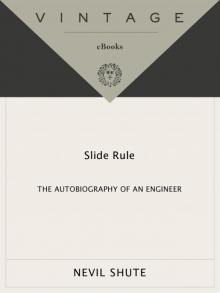 Slide Rule
Slide Rule A Town Like Alice
A Town Like Alice The Far Country
The Far Country Pied Piper
Pied Piper Round the Bend
Round the Bend An Old Captivity
An Old Captivity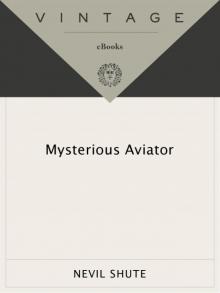 Mysterious Aviator
Mysterious Aviator The Breaking Wave
The Breaking Wave Marazan
Marazan Lonely Road
Lonely Road Pastoral
Pastoral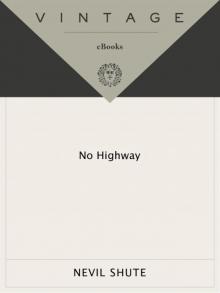 No Highway
No Highway Stephen Morris and Pilotage
Stephen Morris and Pilotage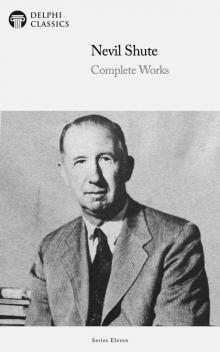 Complete Works of Nevil Shute
Complete Works of Nevil Shute Most Secret
Most Secret Beyond the Black Stump
Beyond the Black Stump The Rainbow and the Rose
The Rainbow and the Rose The Chequer Board
The Chequer Board Trustee From the Toolroom
Trustee From the Toolroom Ordeal
Ordeal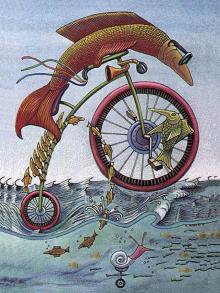 Stephen Morris
Stephen Morris